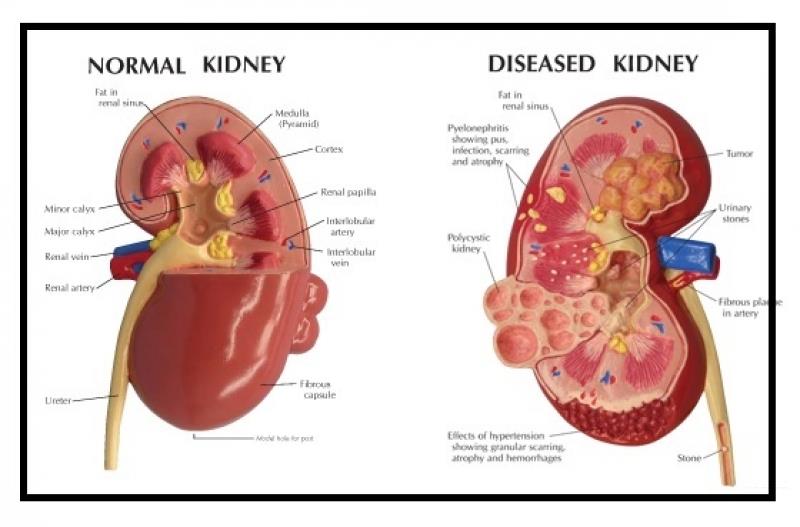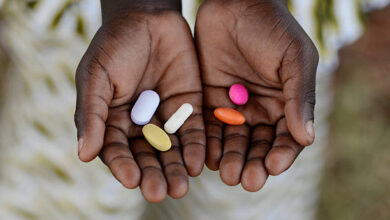All You Need To Know About Kidney Diseases

Your kidneys may be small, but they perform many vital functions that help maintain your overall health, including filtering waste and excess fluids from your blood. Kidney disease can affect your body’s ability to clean your blood, filter extra water out of your blood, and help control your blood pressure. It can also affect red blood cell production and vitamin D metabolism needed for bone health. Without treatment, the damage can get worse and your kidneys may eventually stop working. That can be life-threatening.
Kidney disease causes
Serious kidney disease may lead to complete kidney failure and the need for dialysis treatments or a kidney transplant to stay alive. While effective treatments are available for many kidney diseases, people are sometimes unaware that kidney disease can often be prevented. The following are the major causes of kidney disease.
High blood pressure
The two leading causes of kidney failure, also called end stage kidney disease or ESRD, are diabetes (also called Type 2, or adult onset diabetes) and high blood pressure. When these two diseases are controlled by treatment, the associated kidney disease can often be prevented or slowed down.
Many effective drugs are available to treat high blood pressure. In addition, healthy lifestyle changes, such as losing weight and regular exercise, often help to control, and may even help to prevent, high blood pressure.
Diabetes
Careful control of blood sugar in diabetics helps to prevent such complications as kidney disease, coronary heart disease and stroke. When diabetics have associated high blood pressure, special drugs called angiotensin converting enzyme (ACE) inhibitors may help to protect their kidney function.
Glomerulonephritis
The third leading cause of end stage kidney disease is glomerulonephritis, a disease that damages the kidneys’ filtering units, called the glomeruli. In many cases, the cause of this disease is not known, but some cases may be inherited and others may be triggered by an infection.
Other causes
Some of the other diseases that may affect the kidneys include infections, kidney stones and inherited diseases such as polycystic kidney disease. The kidneys can also be damaged by overuse of some over-the-counter pain killers and by taking illegal drugs such as heroin. Some of these diseases can be cured. In other cases, treatments can help to slow the disease and prolong life.
End stage kidney disease occurs when about 90 percent of kidney function has been lost. People with kidney failure may experience nausea, vomiting, weakness, fatigue, confusion, difficulty concentrating and loss of appetite. It can be diagnosed by blood and urine tests.
Kidney disease symptoms
Your kidneys are very adaptable. They can compensate for some of the problems that can happen when you have kidney disease. So if your kidney damage gets worse slowly, your symptoms will reveal themselves slowly over time. In fact, you may not feel symptoms until your disease is advanced.
You might have:
- Nausea and vomiting
- Loss of appetite
- A metallic taste in your mouth
- Fatigue
- Weakness
- Trouble thinking
- Sleep issues
- Muscle twitches and cramps
- Swelling in your feet and ankles
- Itching that won’t go away
- Chest pain, if fluid builds up around the lining of the heart
- Shortness of breath, if fluid builds up in the lungs
Kidney disease diagnosis
Your doctor will start by asking questions about your family medical history, which medications you’re taking, and if you notice that you’re peeing more or less than normal. After that, they’ll do a physical exam.
You also may have:
- Blood tests, to see how much waste product is in your blood
- Urine tests, to check for kidney failure
- Imaging tests, like an ultrasound, to let the doctor see your kidneys
- A kidney biopsy, where tissue from your kidney is sent to a lab for testing to try and figure out the cause of your kidney issues.
Kidney disease treatment
Some forms of kidney disease are treatable. The goals of these treatments are to ease symptoms, help keep the disease from getting worse, and lessen complications. In some cases, your treatment may help restore some of your kidney function. There is no cure for chronic kidney disease.
The plan you and your doctor will decide on will depend on what’s causing your kidney disease. In some cases, even when the cause of your condition is controlled, your kidney disease will worsen.
Once your kidneys can’t keep up with waste on their own, you’ll have treatment for end-stage kidney disease. This can include:
Dialysis. Waste and extra fluid are taken out of your body when your kidneys can’t do it anymore. There are two types:
- Hemodialysis, where a machine removes the waste and extra fluids from your blood
- Peritoneal dialysis, which involves inserting a thin tube called a catheter into your abdomen. Then, a solution goes into your abdomen that absorbs the waste and fluids. After a while, the solution drains from your body.
Kidney transplant. A surgeon replaces your kidney with a healthy one from a donor. This donor can be living or deceased. After the procedure, you take medicine for the rest of your life to make sure that your body doesn’t reject your new kidney.




